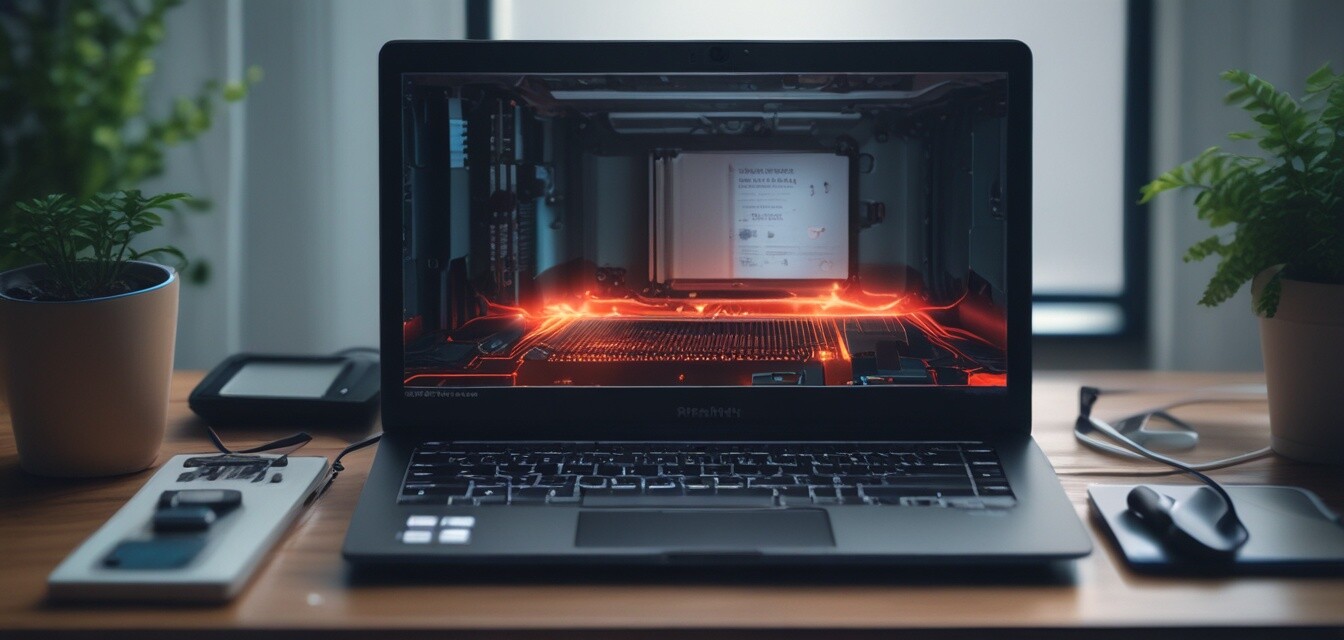
How to Create a Laptop Cooling Setup
Key Takeaways
- Overheating can significantly impact laptop performance and lifespan.
- Implementing an effective cooling solution can help maintain optimal operating temperatures.
- Regular maintenance is essential for preventing dust buildup and ensuring proper airflow.
- Consider investing in cooling pads and thermal pastes for enhanced thermal management.
- Using your laptop on hard surfaces instead of soft fabrics can improve ventilation.
Keeping your laptop cool is crucial, especially during intensive use like gaming or video editing. A proper cooling setup can prevent overheating, enhancing performance and extending your device's lifespan. In this article, we will guide you through several effective tips and tricks to create an optimal cooling environment for your laptop.
Understanding the importance of laptop cooling
When using your laptop for demanding tasks, such as gaming or running multiple applications simultaneously, it generates a lot of heat. This heat, if not dissipated properly, can lead to overheating, causing your laptop to slow down or potentially suffer permanent damage.
Effective cooling solutions
There are several ways to maintain a cooler operating temperature for your laptop:
- Use a cooling pad
- Apply thermal paste
- Ensure proper airflow
- Clean the internal components regularly
- Adjust power settings
1. Use a cooling pad
A cooling pad is a great investment. It's designed specifically to improve air circulation around your laptop. Cooling pads come with fans that increase airflow, helping keep your machine cool during usage.
2. Apply thermal paste
Over time, the thermal paste that aids in heat transfer between the CPU/GPU and the heatsink may degrade. Reapplying high-quality thermal paste can significantly enhance your laptop's cooling efficiency.
3. Ensure proper airflow
Always use your laptop on hard, flat surfaces. Soft surfaces like beds or couches can block ventilation holes, trapping heat. Ensure that the vents are clean and unobstructed to allow efficient air circulation.
4. Clean the internal components regularly
Dust accumulation inside the laptop can hinder airflow, leading to poor cooling performance. Regularly cleaning the vents and considering internal dust removal can help maintain optimal cooling.
5. Adjust power settings
Adjusting your laptop's power settings can minimize heat generation. Utilize battery-saving modes or adjust your power options to reduce CPU performance during less demanding tasks.
How to monitor your laptop temperature
Keeping an eye on your laptop’s temperature is vital in ensuring optimal performance. There are various software tools available that help you monitor your laptop's temperature effectively:
| Software | Features | Platform |
|---|---|---|
| HWMonitor | Real-time temperature monitoring | Windows |
| Core Temp | CPU temperature tracking | Windows |
| SpeedFan | Fan control and temperature monitoring | Windows |
| iStat Menus | System performance tracking | MacOS |
| Open Hardware Monitor | Wide range of hardware temperature monitoring | Cross-platform |
Tips for maintaining a cooler laptop
Beginner's Section
- Keep your laptop clean and avoid dusty environments.
- Invest in a quality cooling pad to enhance airflow.
- Use your laptop on hard surfaces to prevent airflow blockage.
- Regularly toggle power settings based on your usage.
- Consider scheduling regular internal cleaning if you're comfortable with it.
Conclusion
Creating an effective laptop cooling setup is essential to maintaining performance and extending your device's life. Regular monitoring and maintenance can save you from costly repairs or replacements in the future. For more tips on optimizing your technology experience, explore our Expert Tips section.
Pros
- Enhancing performance and longevity of your laptop
- Cost-effective solutions, like cooling pads, are available
- Variety of tools for monitoring temperature
- Potential for DIY cleaning to improve airflow
Cons
- Some solutions require technical knowledge
- Initial investment in cooling accessories may be needed
- Regular maintenance can be time-consuming
By implementing the tips provided in this article, you can build an efficient cooling setup that ensures your laptop remains in peak condition. Embrace the technology and enjoy a better computing experience!